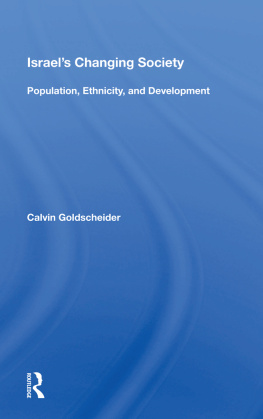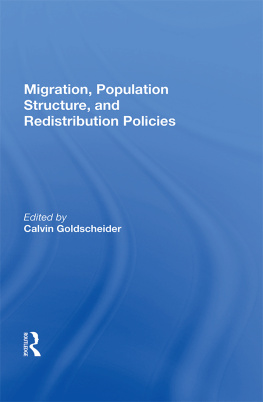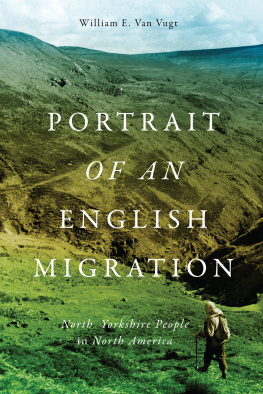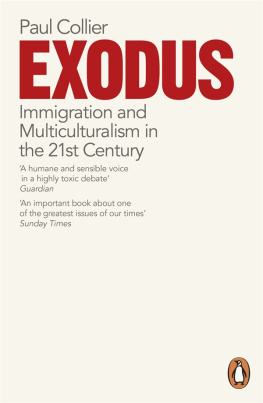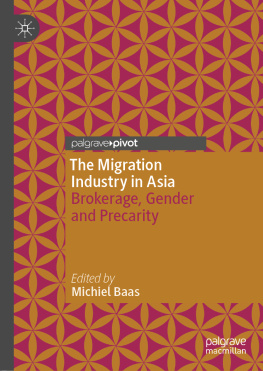
Urban Migrants in Developing Nations
Westview Replica Editions
The concept of Westview Replica Editions is a response to the continuing crisis in academic and informational publishing. Library budgets for books have been severely curtailed. Ever larger portions of general library budgets are being diverted from the purchase of books and used for data banks, computers, micromedia, and other methods of information retrieval. Interlibrary loan structures further reduce the edition sizes required to satisfy the needs of the scholarly community. Economic pressures on the university presses and the few private scholarly publishing companies have severely limited the capacity of the industry to properly serve the academic and research communities. As a result, many manuscripts dealing with important subjects, often representing the highest level of scholarship, are no longer economically viable publishing projectsor, if accepted for publication, are typically subject to lead times ranging from one to three years.
Westview Replica Editions are our practical solution to the problem. We accept a manuscript in camera-ready form, typed according to our specifications, and move it immediately into the production process. As always, the selection criteria include the importance of the subject, the work's contribution to scholarship, and its insight, originality of thought, and excellence of exposition. The responsibility for editing and proofreading lies with the author or sponsoring institution. We prepare chapter headings and display pages, file for copyright, and obtain Library of Congress Cataloging in Publication Data. A detailed manual contains simple instructions for preparing the final typescript, and our editorial staff is always available to answer questions.
The end result is a book printed on acid-free paper and bound in sturdy 1 ibrary-quality soft covers. We manufacture these books ourselves using equipment that does not require a lengthy make-ready process and that allows us to publish first editions of 300 to 600 copies and to reprint even smaller quantities as needed. Thus, we can produce Replica Editions quickly and can keep even very specialized books in print as long as there is a demand for them.
About the Book and Editor
Urban Migrants in Developing Nations: Patterns and Problems of Adjustment
edited by Calvin Goldscheider
What are the effects of migration and the change to city life on migrants and their families in developing countries? How is the quality of life influenced by the influx of migrants into a region? This book addresses these and related questions by focusing on four case studies in Korea (Seoul), Indonesia (Surabaya), Colombia (Bogota), and Iran (Tehran). Based on detailed surveys designed to identify the similarities and diversities of migration, urbanization, and development in a variety of societal and cultural contexts, each case study compares native urbanites with migrants who have resided for various periods of time in the city. Several dimensions of adjustment are emphasized: employment and occupational patterns; housing, consumption, and income; and social and social-psychological aspects. Specific findings resulting from the case studies are examined in the broader context of comparative urbanization, with particular attention to methodological issues associated with studying migrant adjustment.
Calvin Goldscheider is chairman of the Department of Demography and professor of demography and sociology at the Hebrew University of Jerusalem, He is also affiliated with the Population Studies and Training Center and adjunct professor of sociology at Brown University.
Published in cooperation with The Population Studies and Training Center, Brown University
Urban Migrants in Developing Nations
Patterns and Problems of Adjustment
edited by Calvin Goldscheider
With contributions by:
M. Ray Brown
Sarah C. Clark
Robert Corno
Calvin Goldscheider
Sidney Goldstein
Laurie McCutcheon
Alden Speare, Jr.
First published 1983 by Westview Press
Published 2018 by Routledge
52 Vanderbilt Avenue, New York, NY 10017
2 Park Square, Milton Park, Abingdon, Oxon OX14 4RN
Routledge is an imprint of the Taylor & Francis Group, an informa business
Copyright 1983 by Taylor & Francis
All rights reserved. No part of this book may be reprinted or reproduced or utilised in any form or by any electronic, mechanical, or other means, now known or hereafter invented, including photocopying and recording, or in any information storage or retrieval system, without permission in writing from the publishers.
Notice:
Product or corporate names may be trademarks or registered trademarks, and are used only for identification and explanation without intent to infringe.
Library of Congress Cataloging in Publication Data
Main entry under title:
Urban migrants in developing countries.
(A Westview replica edition)
Bibliography: p.
1. Rural-urban migration--Developing countries--Case
studies. 2. Urbanization--Developing countries--Case
studies. I. Goldscheider, Calvin. II. Goldstein,
Sidney, 1927
HB1955.U72 1983 307'.2 83-10372
ISBN 13: 978-0-367-21274-2(hbk)
To the Memory of
DOROTHY SWAINE THOMAS
(1899-1977)
The Population Studies and Training Center at Brown University initiated a Comparative Urbanization Project in 1972-1973, under sponsorship of a Ford Foundation Training Grant to the Center. The objective was to pursue research on questions associated with urbanization, migration, and development in less developed nations.
The program sponsored a non-credit urbanization seminar in which an average of 12 trainees participated each year. This seminar served several purposes. First, the discussions identified a set of common areasof research interests on the part of the faculty and the student seminar participants. Growing out of the interests in the adjustment of rural-to-urban migrants, the seminar developed a set of common core questions for use in field surveys in developing countries as well as sampling designs to be employed. It was expected that a small number of the trainees participating in the seminar would, in turn, undertake field studies which would focus on the adjustment of migrants to big cities in less developed countries. Such studies were intended to give the individual trainee experience in field work, provide the trainee with data for a dissertation, and cumulate a body of comparative data whose analysis would allow better insights into what demographic characteristics distinguish migrants from non-migrants, whether these characteristics affect adjustment in the urban area, and what implications the adjustment process had for the urban area in which the migrants had taken up residence.
Under the Ford Foundation Grant, the Center initially funded four trainees during 1973-1977 to undertake field surveys of approximately 750 households in less developed countries. These urban field operations were completed in Seoul, Korea; Surabaya, Indonesia; Bogota, Colombia; and Tehran, Iran. It is these four studies which provide the basis for this monograph.


